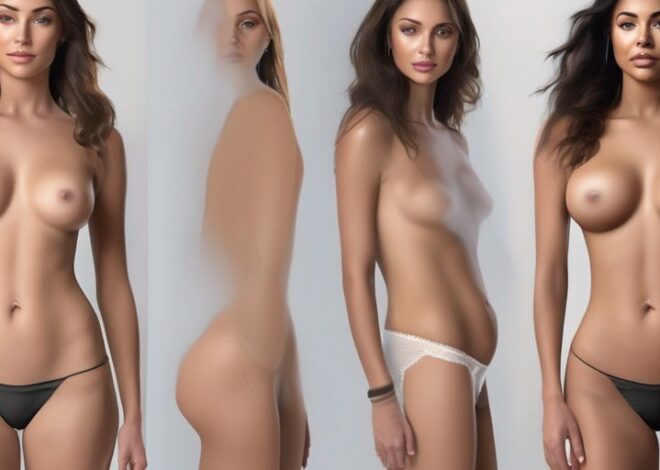
The Future of Fashion: How AI Can Change the Way We Dress and Undress
The intersection of artificial intelligence (AI) and fashion is reshaping the industry in unprecedented ways. From personal styling to manufacturing, AI technologies are revolutionizing how we approach clothes and accessories. This article explores various facets of AI’s impact on fashion, delving into personal styling, virtual shopping experiences, sustainability, design, ethical considerations, marketing, and controversial applications.
Key Takeaways
- AI-driven personal stylists can significantly enhance daily wardrobe choices, tailoring outfits to individual tastes and needs.
- Virtual fitting rooms offer a seamless and efficient shopping experience, reducing the need for physical try-ons and potentially decreasing return rates.
- AI can play a crucial role in promoting sustainable fashion by optimizing supply chains and reducing waste through smarter resource management.
- Ethical considerations are paramount in the integration of AI in fashion, particularly concerning privacy and the use of AI in image alteration and customer data.
- Controversial applications such as Nudify.Online highlight the potential misuse of AI in fashion, stressing the need for strict regulations and ethical guidelines.
AI-Driven Personal Styling: Revolutionizing Wardrobe Choices

Understanding AI Personal Stylists
AI personal stylists leverage machine learning algorithms to analyze your fashion preferences, body type, and current trends to suggest outfits that are both stylish and personalized. This technology not only simplifies the process of choosing what to wear but also ensures that your style is always on point.
Benefits of AI in Daily Wardrobe Selection
The integration of AI in daily wardrobe selection offers significant advantages:
- Personalized fashion recommendations tailored to individual tastes and needs
- Increased efficiency in outfit planning
- Reduction in time and effort spent on selecting outfits
Case Studies: Success Stories of AI Styling
Several brands have successfully implemented AI styling tools, enhancing customer satisfaction and engagement. For instance, a notable online retailer reported a 25% increase in sales after integrating AI-based styling suggestions into their platform. These case studies demonstrate the practical benefits and growing acceptance of AI in fashion styling.
Virtual Fitting Rooms: The New Way to Shop

How Virtual Fitting Rooms Work
Virtual fitting rooms utilize advanced AR & AI technologies to create a digital environment where customers can try on clothes virtually. This technology captures the user’s dimensions using a camera and then overlays the clothing items on the user’s digital avatar. This process not only enhances the shopping experience but also reduces the need for physical trial, making it a convenient option for online shoppers.
Advantages Over Traditional Fitting Rooms
Virtual fitting rooms offer several advantages over traditional fitting rooms:
- Increased convenience by allowing users to try on clothes from anywhere.
- Reduced need for physical space, lowering overhead costs for retailers.
- Enhanced privacy for shoppers, as they do not have to physically change clothes.
Future Developments in Virtual Try-On Technology
The future of virtual fitting rooms looks promising with ongoing advancements in technology. Developers are working on improving the realism of the virtual try-ons and expanding the types of items that can be tried on, such as accessories, watches, and glasses. This will further enhance the user experience and potentially revolutionize the way we shop for clothes.
Sustainable Fashion Through AI

AI in Reducing Fashion Waste
The integration of AI in fashion not only enhances style but also plays a crucial role in reducing waste. By predicting trends more accurately, AI minimizes overproduction, one of the primary sources of waste in the fashion industry. AI-driven analytics help brands produce only what is needed based on real-time data and trend analysis.
Promoting Eco-Friendly Materials
AI aids in the discovery and promotion of sustainable materials by analyzing data on environmental impacts. This leads to more eco-friendly practices in fashion production, aligning with global sustainability goals. The use of AI can significantly accelerate the adoption of materials that are both sustainable and cost-effective.
AI’s Role in Circular Fashion
Circular fashion, which emphasizes the reuse and recycling of materials, benefits greatly from AI technologies. AI systems can track and manage the lifecycle of garments, ensuring that they are used to their fullest potential before being recycled. This approach not only conserves resources but also reduces the fashion industry’s overall carbon footprint.
AI in Fashion Design and Manufacturing

Automating Design Processes
AI is amplifying creativity in fashion design by automating mundane tasks, allowing designers to focus on innovation and aesthetics. AI tools can generate images of clothes from typed prompts, visualizing different materials and patterns. This not only speeds up the design process but also enhances the exploration of unique style combinations.
Customization at Scale
AI enables fashion brands to offer personalized products at a large scale. Customers can input their preferences and measurements, and AI algorithms suggest and tailor designs specifically for them. This approach not only meets individual customer needs but also reduces waste by producing only what is needed.
AI and the Future of Textile Manufacturing
The integration of AI in textile manufacturing promises significant advancements in efficiency and sustainability. AI-driven machines can optimize fabric usage, reducing waste, and energy consumption. Future developments may include smart textiles that adapt to environmental changes, offering greater functionality and comfort to users.
Ethical Considerations in AI-Enabled Fashion

Privacy Concerns with AI Tools
The integration of AI in fashion raises significant privacy concerns, particularly regarding data collection and usage. Consumers often provide personal information without fully understanding how it will be used or who might access it. Ensuring transparency and securing data are crucial to maintaining trust.
Regulating AI in the Fashion Industry
Regulation is essential to address the ethical challenges and legal ambiguities AI introduces. This includes copyright protections, determining ownership, and preventing bias perpetuation. A structured approach to regulation can help mitigate risks and ensure fair use of AI technologies.
Ethical AI Usage in Fashion
Ethical AI usage in fashion should prioritize consumer rights and welfare. It’s important to promote practices that respect user privacy and provide clear user agreements. This can be achieved through rigorous ethical guidelines and regular audits of AI systems to ensure they do not perpetuate existing biases or create new ones.
The Role of AI in Fashion Marketing and Sales

AI-Driven Marketing Strategies
AI is revolutionizing the way fashion brands engage with their audiences. By leveraging data analytics and machine learning, brands can now deliver personalized marketing campaigns that are more likely to resonate with individual consumers. AI models trained on a brand’s visual style can generate images, layouts, and even video scripts that complement textual content, creating a holistic brand experience.
Enhancing Customer Experience with AI
The integration of AI tools in customer service platforms allows for a more seamless and efficient interaction with consumers. AI chatbots can handle inquiries and provide recommendations based on user preferences and past purchases, significantly improving response times and customer satisfaction.
Predictive Analytics in Fashion Sales
AI’s ability to analyze vast amounts of data and predict trends is invaluable in fashion sales. Predictive analytics help brands anticipate market demands, optimize inventory levels, and tailor their marketing efforts to meet the expected trends, thus enhancing overall sales performance.
Controversial AI Applications in Fashion

The Debate Over AI-Driven Image Alteration
The use of AI to alter images in fashion advertising has sparked significant debate. Critics argue that it can distort public perceptions of beauty and body standards, leading to unrealistic expectations. Supporters, however, claim it allows for creative freedom and inclusivity in representations.
Impact of AI on Fashion Photography
AI’s integration into fashion photography is transforming the industry. It enables enhanced image editing and styling capabilities, which some believe diminishes the authenticity of the photographic art. Others see it as a tool for innovation and efficiency in creating compelling visual narratives.
Case Study: Nudify.Online
Nudify.Online represents a particularly controversial use of AI in fashion. This web-application uses sophisticated AI to digitally remove clothing from images. It raises serious privacy and ethical concerns, particularly regarding consent and the potential misuse of the technology.
Note: The ongoing discussions and regulations surrounding these applications are crucial for shaping the future of AI in fashion.
Conclusion
As we explore the vast potential of AI in the fashion industry, it’s clear that technology is not just reshaping how we dress but also redefining the boundaries of privacy and ethics. Applications like Nudify.Online, which uses advanced AI to digitally remove clothes from images, highlight the dual-edged nature of this technological evolution. While AI can offer incredible innovations in design and personalization, it also prompts a crucial discussion on the ethical implications and the need for robust regulations. As we move forward, it is imperative that innovation is matched with responsibility, ensuring that the future of fashion is both exciting and ethically sound.
Frequently Asked Questions
What is AI-driven personal styling?
AI-driven personal styling utilizes artificial intelligence to analyze your fashion preferences, body shape, and current trends to suggest outfits that will look best on you. It helps streamline your wardrobe choices and personalize your style.
How do virtual fitting rooms enhance the shopping experience?
Virtual fitting rooms allow customers to try on clothes virtually using digital technology. This provides a convenient and personalized shopping experience, allowing users to see how garments look on them without physically trying them on, saving time and enhancing decision-making.
What role does AI play in sustainable fashion?
AI contributes to sustainable fashion by optimizing supply chains, reducing waste through predictive analytics, and promoting the use of eco-friendly materials. It also supports circular fashion practices by helping companies reuse and recycle materials more efficiently.
Can AI in fashion design lead to better customization?
Yes, AI can significantly enhance customization in fashion design by analyzing consumer data to tailor designs according to individual preferences and sizes, thus offering a more personalized shopping experience and reducing returns due to poor fit.
What are the ethical concerns associated with AI in fashion?
Ethical concerns include privacy issues, as AI tools often collect and analyze personal data. There’s also a need for regulation to ensure AI is used responsibly in fashion, preventing misuse that could harm individuals or groups.
What is Nudify.Online?
Nudify.Online is an advanced web-application launched in 2024, designed to digitally remove clothes from images of people using sophisticated AI technology. This controversial application has sparked debates over privacy and the ethical use of AI in fashion.



